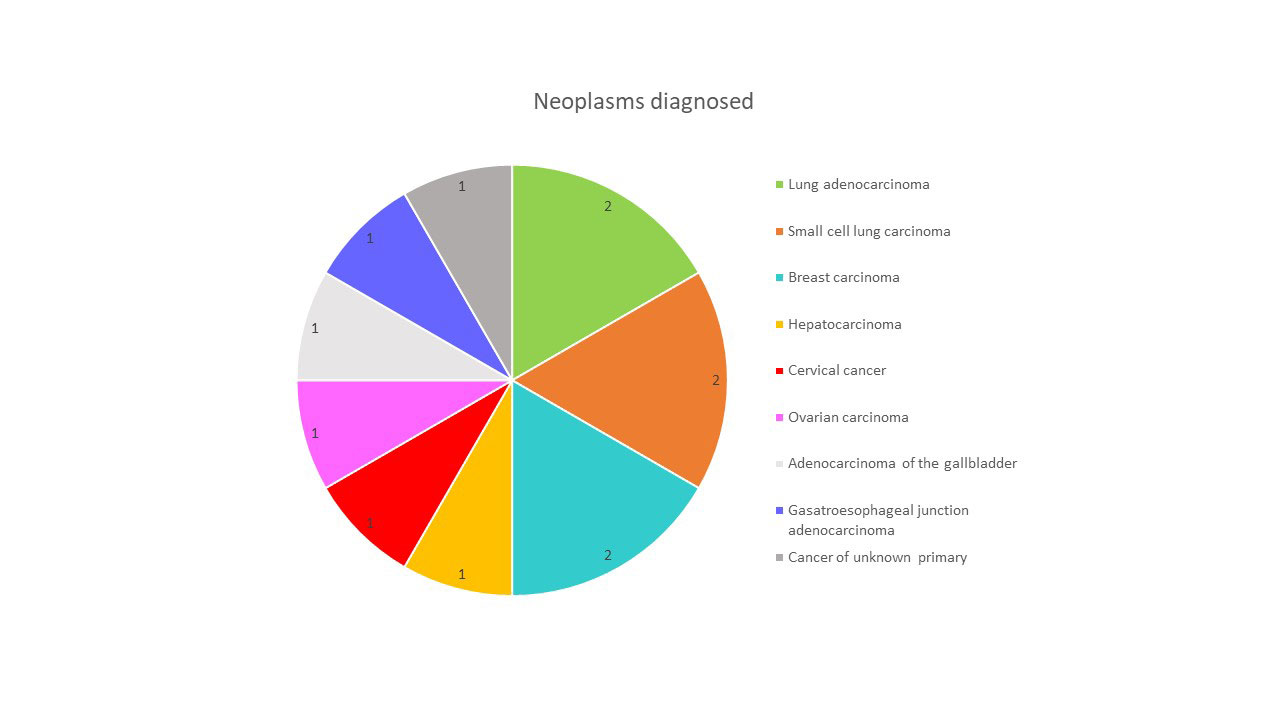Session Information
Session Type: Poster Session D
Session Time: 1:00PM-3:00PM
Background/Purpose: Anti-transcriptional intermediary factor 1γ (anti-TIF 1γ) antibody is robustly linked with malignancy-associated dermatomyositis (DM) in adults, but its specificity varies widely between series. TIF 1γ can act either as a tumor promoter or suppressor and may act as an autoantigen.
To investigate the association between anti-TIF 1γ antibody positivity and the development of neoplasia.
Methods: A retrospective chart review was conducted among patients with positive anti-TIF 1γ antibodies detected by immunoblot from March 2019 to May 2022 in three tertiary hospitals. Demographic variables, creatine kinase (CK) values, other autoantibodies, associated autoimmune diseases (AID) and existence or not of cancer diagnosis were analyzed. To rule out malignancy, patients had to present a PET-CT scan without pathological findings or a chest computed tomography scan, a gynecological study and a digestive study without alterations. A descriptive statistical analysis was performed.
Results: 31 patients with anti-TIF 1γ antibodies were analyzed, 80.6% women, with a mean age of 61.6 years (31-96 years). The reason for requesting this antibody were: clinical features suggestive of DM in 12 patients (38.7%), muscle weakness in 9 (29%), interstitial lung disease (ILD) in 5 (16.1%), persistent elevation of CK elevation in 3 (9.7%), constitutional syndrome in 1 (3.2%) and antiphospholipid syndrome in 1 (3.2%). The mean time from symptoms onset to the detection of anti-TIF 1γ was 13 months (0-60 months). Twenty two patients (70.9%) had an associated AID (graph 1). Five patients (16.1%) had ILD with different patterns: usual interstitial pneumonia (n=2), nonspecific interstitial pneumonia (n=2) and cryptogenic organizing pneumonia (n=1). Only 11 (35.5%) had elevated CK levels at the time of antibody determination. Of our sample, 12 patients (38.7%) were diagnosed with cancer (graph 2). Of those, 9 (75%) had elevated CK levels and 8 (66.7%) had a diagnosis of DM. None of the patients diagnosed with cancer had IDL. In 5 patients (41.7%), the diagnosis of cancer was simultaneous with the diagnosis of anti-TIF 1γ antibodies; in 5 (41.7%), the diagnosis of the tumor preceded the finding of the antibodies; in 2 (16.7%), the finding of the antibodies preceded that of the tumor. Two patients have newly been diagnosed (< 6 months); 30 month survival after cancer diagnosis in the other 10 was 10%. In 17 patients (54.8%) no malignancy has been found so far in the annual cancer screening. In 2 patients (6.5%) no cancer screening was performed.
Conclusion: In our study, 61.5% of patients with DM and anti-TIF 1γ presented neoplasia, a prevalence similar to that established in other series (60-80%). Furthermore, 22.2% of patients with antibodies and without DM were diagnosed with cancer, suggesting that anti-TIF 1γ antibodies could also be associated with neoplasia in patients without DM. Patients with ILD did not present cancer, supporting the observation of previous studies in which the presence of ILD is a marker of low risk for neoplasia in patients with DM. HyperCKemia might predict the association with neoplasia in patients with anti-TIF 1γ antibodies.
To cite this abstract in AMA style:
Pavía Pascual M, Jarque Canalias I, Morell J, Loarce Martos J, Montaño Tapia L, Rusinovich O, de la Torre-Rubio N, Machattou M, Navarro Palomo P, Barbadillo Mateos M, Fernandez Castro M, Garcia-Magallon B, Godoy Tundidor M, Merino C, SANZ SANZ J, Andreu J, Campos J. Association Study Between anti-TIF1γ Antibody and Development of Neoplasia in Three Tertiary Hospitals [abstract]. Arthritis Rheumatol. 2022; 74 (suppl 9). https://acrabstracts.org/abstract/association-study-between-anti-tif1%ce%b3-antibody-and-development-of-neoplasia-in-three-tertiary-hospitals/. Accessed .« Back to ACR Convergence 2022
ACR Meeting Abstracts - https://acrabstracts.org/abstract/association-study-between-anti-tif1%ce%b3-antibody-and-development-of-neoplasia-in-three-tertiary-hospitals/


